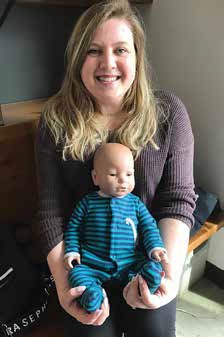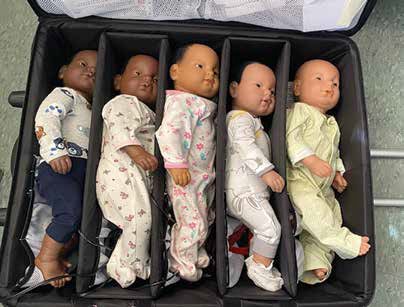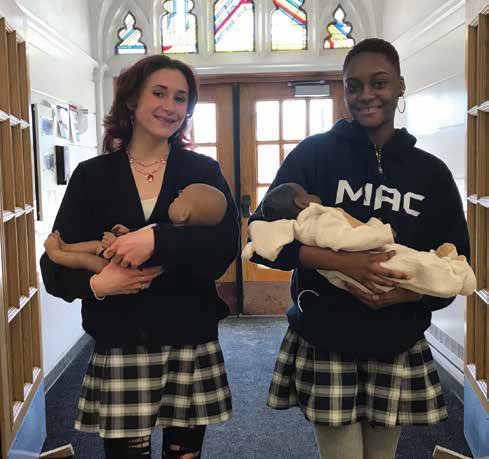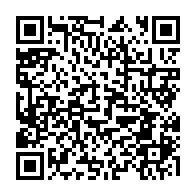Lori Gandy
Immaculata High School teacher Jillian Budgell says she has the best job in the school because she teaches the fun courses: theatre, cooking/hospitality and the Parenting course. She especially loves teaching the Raising Healthy Children unit of the latter, which includes a hands-on newborn care-giving experience. Students ‘check out’ a RealCare Baby3 Infant Simulator for 24 hours. These RealityWorks ‘babies’ have wireless programming to track and report on babycare behaviours. The babies look like real newborns and they ‘cry’ when they need to be fed, burped, rocked or changed.
How it works
The babies come with security ID tags, each with a serial number that Budgell programs to a specific baby. Students wear a hospital bracelet with a tag programmed to their baby and they can’t take it off. Every time the baby fusses, students must tap their wrist tag to one of the baby’s sensors; a chime sounds, indicating the system recognizes the parent is present.
“If students don’t scan the tag, nothing works,” says Budgell. “So they can’t give baby to a parent while they go to the mall.”
As Budgell explains: “When baby needs something, it starts to fuss, and the noise gets progressively louder. The student has two minutes to scan their tag and respond to the baby’s need. Otherwise a “miss” will be recorded. The baby will keep crying until the student figures out what the baby needs.”
Feeding, burping and changing
Each baby comes with a bottle with a tiny sensor. As soon as the bottle is near the baby’s face, the crying will switch to a sucking sound. Feeding can take anywhere from a few minutes to up to 30 minutes and if the student stops too soon, the baby will start fussing.
After feeding, burping might be required. Sometimes baby needs to be rocked. Students must handle the baby with care at all times as there’s a motion sensor inside the baby. There’s also a sensor to track if the student keeps the neck supported. If they mishandle the baby, it starts to scream. If feeding wasn’t the correct response, the baby will keep crying. Each baby also has two diapers with colour-coded tags. Students must switch the baby’s diaper to satisfy the diaper-change requirement.

Jillian Budgell, who teaches the Parenting course at Immaculata, is pictured here with one of her ‘babies’. Photo by Lori Gandy
The student experience
“Students are really excited when they get the babies,” says Budgell. “But the next day when they bring them back, they are like: ‘Take it!’”
Amber-Rose Erysthee and Isabella Schoorl completed their stints as new moms in March. Both had previous experience with babies/children: Erysthee helped with a younger sister; Schoorl has been babysitting for the past 7 years. But they were both surprised at the challenges they faced as new moms.
Schoorl says of her experience with her baby, Opal: “I really enjoyed the experience of being a parent for a little bit,” she says. “Some things, I expected. I knew she was going to cry. But there was definitely anxiety at times when she was screaming, and I didn’t know what she wanted. It was so loud, so continuous.”
As Erysthee says of caring for baby Hakim, “I thought it was going to be easy, that I could handle it.” She was surprised and proud about how she managed. “It was difficult, but I stayed calm under the pressure. When he started crying, I relaxed, told myself to just breath. I was really good, surprisingly.”
The truth about parenting shocked them: “Oh my gosh!” says Erysthee. “It’s very time-consuming and you have to set your life around the baby. You can’t think about yourself anymore. I mean, it’s yours. You cannot just say ‘I’ll take care of you later.’ You have to do it right now because they’re depending on you. I learned a lot about myself too.”
Schoorl agrees: “There’s so much more responsibility than I’ve ever imagined. I just barely handled this 24-hour shift.” Schoorl spoke about the toll it took on her: “By the end of the day I was trying to get things done, and I went to see my girlfriend after school and I just wanted to hang out with her, but the baby needed something. Then I went home and wanted to make something to eat but I couldn’t because the baby needed something.”

The five babies – three boys and two girls, are snuggled in the suitcase where they are stored and recharged. Photo by Jillian Budgell
When asked about the biggest challenge of caring for a newborn, there was complete agreement.
“Sleeping at night,” says Schoorl. “I was about to go to sleep when the baby started screaming, so I got up and fed her. Then she woke up at 2am and 4am and 6 am. It was a continuous thing. In the morning, I felt really drained and exhausted.”
“Definitely sleeping,” says Erysthee. “Because you are tired and have to take care of him as well. I wanted to sleep, and I was, like, oh my gosh.”
Erysthee and Schoorl both said they appreciate their parents more after this experience.
Schoorl laughs: “They tell me stories about how I was such a good kid. But I’m thinking there were probably times when they just wanted to put me somewhere else.” Erysthee agrees. “Yes, oh my gosh, yes. My mom has three kids and I’m like, how do you do it?”
Important lessons learned that will serve them well in the future. Schoorl is planning a career in Early Childhood Education. Erysthee wants to study social work and develop a business to support pregnant women who are single and alone.
The Mainstreeter wishes them both much success in their future endeavours.







